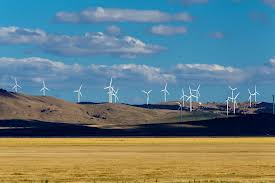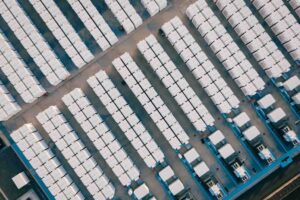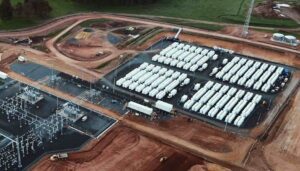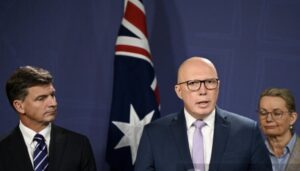The prospects of a re-start of large scale renewable energy projects in Australia dimmed further on Friday when Treasurer Joe Hockey described the sight of wind turbines as “utterly offensive.”

Hockey, speaking to ultra-conservative shock-jock Alan Jones on radio 2GB, said wind turbines were a “blight on the landscape” and vowed to axe “the vast number” of environmental agencies
Hockey’s comments were made after Jones asked him about the “nonsense” of climate change, and renewable energy policies, and asked why – when the government had rejected support for SPC Admona and car makers – was it “chasing” Thai and Chinese-made wind turbines.
This is the conversation from there:
Hockey: “If I can be a little indulgent, I drive to Canberra to go to parliament and I must say I find those wind turbines around Lake George to be utterly offensive.”
Jones: “Correct.”
Hockey: “I think they’re just a blight on the landscape.”
Jones: “Correct. The people you are talking to are paying for them. When are you going to knock them off?”
Hockey: (chuckling) “Well, we can’t knock those ones off, they are into locked into a scheme. There is a certain contractual obligation, I’m told, associated with those things. But you will see in the budget we will address the massive duplication that you have talked about, the vast number of agencies involved in the same thing. We have considered that very carefully. When I say we’ve seen the age of entitlement, that applies to business as much as it applies to the rest of us.”
Hockey also told Jones that the government would cut a swathe through environmental agencies, including, he said, the Clean Energy Regulator, which environment minister Greg Hunt says we need to manage and operate the emissions reduction fund in the ludicrous Direct Action scheme.
Hockey probably meant the Clean Energy Finance Corporation. Attention to detail has not been the government’s strong point, and it has been determined to dismantle any authority or scheme with the words “clean” or “climate” or “carbon” in front of it – the carbon price, the Climate Commission, the Climate Change Authority – even the Cleantech awards had to be renamed.
The CEFC, along with the Export Finance Investment Corporation, attracts private funds, and delivers a positive return to the government. But even EFIC has been slated for closure in what the AFR’s Chanticleer columnist described as one of a series of “brain explosions” from the Far Right revealed in the National Audit Commission.
 The wind turbines around Lake George that Hockey finds so offensive are part of Infigen Energy’s Capital wind farm (pictured). Neighbouring regions areas are a hot-bed of anti-wind farm activitism, particularly from business leaders such as Maurice Newman, Abbott’s hand-picked head of his business advisory body.
The wind turbines around Lake George that Hockey finds so offensive are part of Infigen Energy’s Capital wind farm (pictured). Neighbouring regions areas are a hot-bed of anti-wind farm activitism, particularly from business leaders such as Maurice Newman, Abbott’s hand-picked head of his business advisory body.
Local state MP Pru Goward, the newly appointed minister of planning for NSW, has described wind turbines as “hideous”, and federal MP Angus Taylor is one of the many fierce opponents of wind farms in the Coalition. Amid all this, the ACT government is trying to commission 200MW of wind capacity as part of its plans to go 90 per cent renewable.
The federal government, on the other hand, appears comfortable with 90 per cent fossil fuels. It has commissioned a review panel to assess the renewable energy target, and has chosen a team led by climate change denier Dick Warburton, who has said that nuclear energy is the only viable alternative to coal, to make a judgement on the scheme that is designed to bring in more wind and solar energy to the energy system.
The constant uncertainty about green energy policy has meant that no new large scale wind farms have been committed in Australia since 2012 – apart from some solar farms supported by other schemes, and the massive investment by Australian households in rooftop solar. The emergence of solar, and soon enough storage, as a cost competitive alternative to energy delivered through expensive networks, is causing Australia’s major utilities to reassess their business models, and the way they deliver electricity. However, they lament that politicians and regulators are looking to the past, rather than the future.
They have argued, as has Tony Abbott, that the renewables scheme is very expensive, even though regulators note that it adds only about 3 per cent to consumer bills.
The Clean Energy Council this week produced a report that suggested that the fall in wholesale prices caused by the influx of renewables would offset the cost of certificates and actually lead to cheaper bills for consumers in the medium to long term.
This assessment was rejected by Hunt this week. And in a further sign of the government’s, and the panel’s hard-line attitude to renewables, Warburton said a complete dismantling of the renewable energy target could not be ruled out, even though this would lead to billions of dollars in losses, and to the removal of the “contractual obligation” that Hockey appeared to lament.
The Australian Renewable Energy Agency is also in danger of having its funding stripped and of being absorbed back into a government department.










